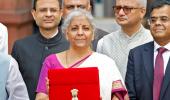From the word go, Bihar growled its needs out when an MP from the state said aloud: "Give something for Bihar also, Madam."
Every time the Budget mentioned cities and towns in Andhra Pradesh, "Kursi Bachao" was the call from Congress MPs.

The new political context was the underlay of the final Budget 2024-2025. And it was quite a change.
Unlike the 2019 interim and final Budgets (where the change in the two versions was negligible), this Budget -- and the reactions to it -- reflected the new Lok Sabha, with reduced numbers of the Bharatiya Janata Party, its dependence on alliance partners, the Telugu Desam Party and the Janata Dal-United, and the number of times Andhra Pradesh and Bihar cropped up in the Budget speech.
"What about Kerala?" asked Congress MP from Ernakulam Hibi Eden when Finance Minister Nirmala Sitharaman mentioned assistance to states like Bihar struck by flooding, leading to loud jeers.
"What about Tamil Nadu?" questioned Dravida Munnetra Kazhagam MP Dayanidhi Maran when allocations were announced to projects to support development of tourism in Bihar like Nalanda and Rajgir.
"This is an Andhra Pradesh-Bihar Budget," said NCP leader Supriya Sule.
However, speaking to Business Standard immediately after the Budget, Sitharaman said the deviation from the interim Budget was minor, and only one of accent.
"I have not deviated from the spirit of the interim Budget," she insisted. She said the creation of the capital city of Amaravati was an imperative the Union Budget needed to support.
She was referring to the 'special' assistance to Andhra, within the norms set by the Finance Commission.
But it was in the accent that the story lay.

Possibly for the first time in Lok Sabha's history, Speaker Om Birla, as he entered, was greeted not just with cries of 'Bharat Mata ki Jai' but also with 'Assalam Waleikum'.
Chants of 'Modi' were absent and 'Jai Shri Ram' was subdued. From the Opposition, there were some jeers of '400 Paar'.
From the word go, Bihar growled its needs out when an MP from the state said aloud: "Give something for Bihar also, Madam."
Every time the Budget mentioned cities and towns in Andhra Pradesh, "Kursi Bachao" was the call from Congress MPs, directed towards the rows where TDP lawmakers were sitting. They just grinned and gestured to the Opposition to pipe down.
Support to Assam -- where the Brahmaputra, "which originates in another country", routinely causes flooding -- Sikkim, and Bihar, where talks with "Nepal on flood control are progressing", saw External Affairs Minister S Jaishankar applaud.
Sitting next to him, Minister for Commerce Piyush Goyal listened carefully to the customs duty proposals, smiling at the announcement of the abolition of the angel tax.
There was bipartisan applause too: For exemption of customs duty on some cancer detection equipment. The treasury benches strongly endorsed higher allocations for the Pradhan Mantri Gram Sadak Yojana, reflecting new priorities after the electoral setback.

But it was not just the past election that appeared to worry ruling party MPs.
Dhairyasheel Mane, the Shiv Sena MP from Hatkanangale, Maharashtra, regretfully said: "Not even a mention of Maharashtra."
The state is set for assembly election later this year, which promises to be bitterly contested. Shrikant Shinde, the Shiv Sena MP from Kalyan constituency in Maharashtra, said Andhra Pradesh could have its Rs 15,000 crore for new cities.
"We (Maharashtra) are a state that gives: Our infrastructure creation alone amounts to Rs 15 lakh crore," he said.
There was assertion from the BJP as well. Opposition MPs who tried to interrupt the Budget speech were shouted down.
The colours in the House -- red caps of the Samajwadi Party, sky-blue jackets of some Trinamool Congress MPs, and turmeric yellow of the TDP -- reflected the new political reality.
But equally visible was saffron: Not just on the floor of the House. Possibly for the first time, there were many guests in the visitors' gallery clad entirely in saffron.
As she left the House, Sitharaman waved to her daughter Vangmayee and members of her extended family.
The colours she wore were subdued but regal: White sari, with a broad purple zari-embellished border.
The sari was a salute to the state she comes to Parliament from: Mysore crepe silk, fabric that no state in India other than Karnataka can weave.
Feature Presentation: Ashish Narsale/Rediff.com












 © 2025
© 2025